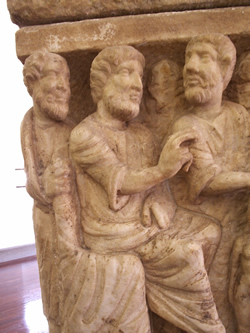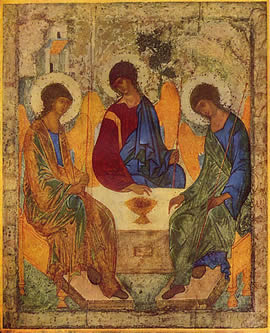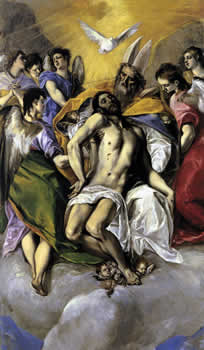The Infinite God as Truly Intimate
Trinity Sunday
For Sunday June 3, 2012
Lectionary Readings (Revised Common Lectionary, Year B)
Isaiah 6:1–8
Psalm 29
Romans 8:12–17
John 3:1–17
Among Western churches, both Protestant and Catholic, the first Sunday after Pentecost is Trinity Sunday. It's a day when we celebrate the triune nature of the one true God.
Many liturgies this Sunday will include the sixth-century Athanasian Creed, that "we worship one God in trinity, and trinity in unity; neither confounding the persons; nor dividing the essence." We don't know who wrote the Athanasian Creed, but it's careful to make both affirmations and denials.
 |
Dogmatic Sarcophagus, 350 A.D., Vatican Museum, Rome. The earliest known depiction of the Trinity. |
Christians affirm the unity and co-equality of the Godhead: we worship and glorify not only the Father, but also the Son and the Holy Spirit. We deny both tritheism — that we worship three gods, and subordinationism — that the Son or the Spirit are subordinate to the Father.
Whereas most Protestants and Catholics affirm the Athanasian Creed, it never enjoyed widespread use in Eastern Orthodoxy. This is strange, because Eastern theologians like the Cappadocian fathers of the fourth-century — Basil the Great of Caesarea, his brother Gregory of Nyssa, and their friend and bishop of Constantinople Gregory Nazianzus, made major contributions to the doctrine of the trinity.
When Eastern Orthodox believers celebrate the Trinity, they start in a different place than their western cousins. And it's a good place to start when worshipping God. Western theology tends toward intellectual abstraction. Eastern theology emphasizes adoration of the mystery. It has always been wary of the inadequacies of human language, the limitations of the human mind, and the infinity of God.
The desert father and intellectual Evagrios of Pontus (345–399), who spent the last sixteen years of his life among unlettered Coptic peasants in the harsh Egyptian desert, one observed: "God cannot be grasped by the mind. If he could be grasped he would not be God."
Similarly, the Syrian monk and bishop John of Damascus (676–749) wrote in his Exposition of the Christian Faith (I.4): "It is plain, then, that there is a God. But what he is in his essence and nature is absolutely incomprehensible and unknowable. God then is infinite and incomprehensible; and all that is comprehensible about him is his incomprehensibility."
 |
Andrei Rublev, Holy Trinity, c. 1400. |
Evagrios and John of Damascus emphasize the radical transcendence of the infinite God. Both Old Testament readings this week reinforce this truth. Isaiah had a vision; the psalmist heard a voice.
Isaiah feared death when he saw the holy God "high and exalted." The seraphs covered their faces, earthquakes shook the foundations, and thick smoke filled the temple. "Woe to me! I am ruined! I am a man of unclean lips, and I live among a people of unclean lips, and my eyes have seen the King, the Lord Almighty."
Psalm 29 mentions "the voice of the Lord" seven times. God's voice thunders over mighty waters, splinters the cedars, twists the oaks, and rips the bark off a tree. The psalmist compares God's voice to a bolt of lightning.
But God's radical transcendence is only part of what we celebrate on Trinity Sunday. God is surely infinite. But both the gospel and epistle remind us that he's also intimate.
Paul contrasts two ways of relating to God. We don't relate to God as a slave who fears a master, but as a child who feels safe with a father: "Abba, Father" (Romans 8:15, Galatians 4:6). "Abba" is the Aramaic word used by Jesus that means something like "Papa." The word is used only three times in the New Testament, and conveys a shocking sense of human intimacy with the divine Infinite. It's a word that little children first learning to speak used for their father, and that Jesus himself used to speak to God in Mark 14:36.
God loves the world, says Jesus, and longs to save the world rather than condemn it.
 |
The Trinity by El Greco, 1577. |
I like how Bartholomew I, the Ecumenical Patriarch and spiritual leader over all the Eastern Orthodox churches, captures both God's transcendence and immanence in his book Encountering the Mystery (2008): “God as unknowable and yet as profoundly known; God as invisible and yet as personally accessible; God as distant and yet as intensely present. The infinite God thus becomes truly intimate in relating to the world” (186).
Some time ago a reader from Vermont sent me the poem Immersion by Denise Levertov (1923–1997). Levertov was born in Britain and moved to the United States when she was twenty-five. In 1989, during her eleven years as a professor at Stanford University (1982–1993), she converted to Christianity. Her book of thirty-eight poems The Stream and the Sapphire (1997) traces her journey from agnosticism to faith. Immersion is only one of many of her poems that explores our human intimacy with the divine infinite.
There is anger abroad in the world, a numb thunder,
because of God's silence. But how naive,
to keep wanting words we could speak ourselves,
English, Urdu, Tagalog, the French of Tours,
the French of Haiti.
Yes, that was one way omnipotence chose
to address us-Hebrew, Aramaic, or whatever the patriarchs
chose in their turn to call what they heard. Moses
demanded the word, spoken and written. But perfect freedom
assured other ways of speech. God is surely
patiently trying to immerse us in a different language,
events of grace, horrifying scrolls of history
and the unearned retrieval of blessings lost for ever,
the poor grass returning after drought, timid, persistent.
God's abstention is only from human dialects. The holy voice
utters its woe and glory in myriad musics, in signs and portents.
Our own words are for us to speak, a way to ask and to answer.
Sometimes it feels like God abstains from the world in silence. But maybe that's because we expect him to conform to our own limited language. Yes, sometimes God speaks directly and simply, like he did when he spoke to Moses "face to face." But God is also perfectly free, Levertov reminds us, and so he has "others ways of speech" and "myriad musics." I like to think that on Trinity Sunday in particular "God is surely patiently trying to immerse us in a different language, events of grace, horrifying scrolls of history and the unearned retrieval of blessings lost for ever."
Image credits: (1) Wikipedia.org; (2) Artcyclopedia.com; and (3) Lib-Art.com.





